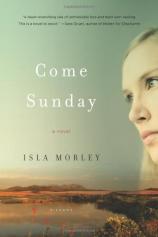Reading Group Guide
Discussion Questions
Come Sunday

1. At its heart, Come Sunday is a tale of joy reclaimed. What is the source of Abbe’s resilience? Which small moments gave her the grandest glimpses of hope?
2. Isla Morley portrays the experience of parenthood with a blend of unflinching candor and wise tenderness. How was Abbe’s identity as a woman shaped by her relationship with her own mother? How was her brother, Rhiaan, affected by his father’s shadow? How does the relationship between mothers and daughters compare to that of fathers and sons?
3. Discuss the novel’s two locales. Do they share any similarities? What traces of South African culture does Abbe miss the most? Who is her greatest source of comfort in Hawaii and in South Africa?
4. What made Greg and Abbe compatible in so many ways? Why was it necessary for her to let him go? In what way was this decision destined to bring peace to both of them?
5. In chapter five, Abbe compares Greg to Sal, commenting that Greg is comparable to a playground sandbox, while Sal is like a merry-go-round. “It is hard to get hurt in the sandbox,” she says. “After my father, it was all I ever wanted in a man.” By the end of the novel, how does she feel about trust and love?
6. How is Abbe healed by returning to her homeland? How does she define “home” at various points in the novel, from the modest house she shares with Greg to the restored, fruitful farm of her youth? Where have you felt most at home, and most restored, throughout your life?
7. What were the most lasting lessons that Abbe learned from Beauty, both as a child and when she returned later in life?
8. What transformations took place in Abbe after she began to see her mother as a lion who would do anything to protect her children? What images best capture the spirit of your mother?
9. In emotional terms, what did it take to bring about the reunion with Abbe’s brother, Rhiaan? What accounts for their very different approaches to life?
10. Near the end of chapter twenty, in the midst of the attack, Abbe hears Pepsi sing the words that give the novel its title. What does Sunday come to mean for Abbe? How does the media’s depiction of the crime differ from the way Abbe experienced it?
11. What is the effect of the first-person voice that drives the novel? What is special about Abbe’s perspective on the world?
12. How does Abbe combine rational thinking and faith to call into question the nature of God? Ultimately, what answers does she find?
13. In chapter twenty-two, Abbe and Rhiaan debate whether their mother’s secret actions affected them. Abbe argues that “who she was influences who we are, how we act.” Rhiaan thinks that’s a moot point: “What you did . . . [was] because of who you are.” Who did you side with in this argument? How much was your identity influenced by family lore?
14. As the author introduced you to South Africa, her birthplace, what surprised you most about its history and culture, and about life there after apartheid?
15. What aspects of hope are captured in the novel’s structure, tracing the journey from Good Friday to Ascension Day?
16. How did you react when Abbe initially rebuked Greg for forgiving Mr. Nguyen? What leads to her change of heart? Describe the greatest difficulty you ever experienced with forgiveness.
17. What were Cleo’s greatest gifts to those who knew her?
Come Sunday
- Publication Date: May 26, 2009
- Genres: Fiction
- Hardcover: 336 pages
- Publisher: Sarah Crichton Books
- ISBN-10: 0374126879
- ISBN-13: 9780374126872








